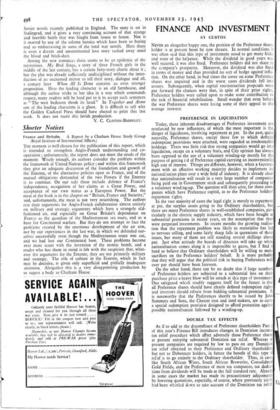Shorter Notices
France and Britain. A Report by a Chatham House Study Group (Royal Institute of International Affairs.) THE moment is well chosen for the publication of this report, which 6s intended to strengthen Anglo-French understanding and co- operation' unfortunately, the report does not meet the needs of the moment. Wisely enough, its authors consider the problem within the framework of United Nations policy ; and within this framework they give an adequate discussion of the foundation and growth of the Entente, of the alternative policies open to France, and of the mutual obligations demanded of the two Powers if the Entente is to continue. Orr our side these include defence of France's independence, recognition of her claims as a Great Power, and acceptance of our own status as a European Power. But the meat of the book is in the chapter on " Britain, France and Security," and, unfortunately, the meat is not very nourishing. The authors rest their arguments for Anglo-French collaboration almost entirely on military and strategic arguments which have a strangely &A- fashioned air, and especially on Great Britain's dependance on France as the guardian of the Mediterranean sea route, and as a base for Continental warfare. But they do not attempt to face the problems created by the enormous development of the air arm, nor by our experiences in the last war, in which we defended our- selves successfully eve though the M n Mediterranean route was cut,
and we had lost our Continental base. These problems .become ever more acute with the invention of the atomic bomb, and a reader who has them in mind is left with the suspicion that, what- ever the arguments for the Entente, they are not primarily military and strategic. The role of culture in the Entente, which in fact may be decisive, is given only superficial and pitifully inadequate attention. Altogether this is a very disappointing production by so august a body as Chatham House.


























 Previous page
Previous page